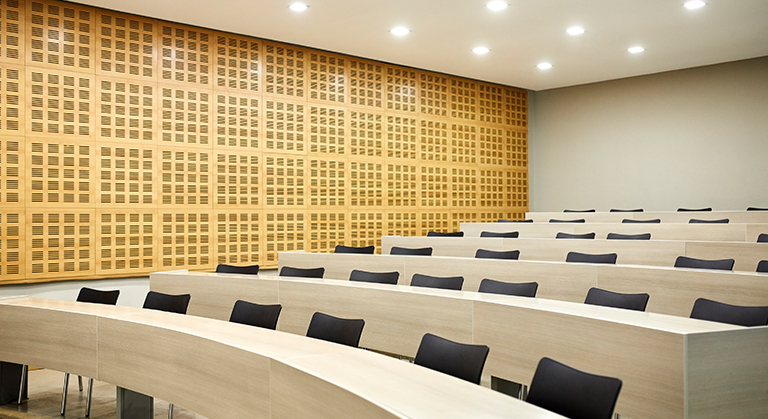Power cuts are very common in many localities, and they have a greater impact today. With digitization of our educational methods, there is an increased dependence on modern gadgets and electronic devices, and hence on the power supply needed to run these systems.
A few hours of sudden power outages would mean not just losing out on the day’s lessons and exercises but a lot of important data as well. Be it a play-school, kindergarten, primary, secondary, or an institution of higher education, teaching cannot take place in the absence of power.
Backup power supply is a must for every education facility housing students of all ages. One of the main concerns could be estimating the amount and duration of power required to facilitate the entire building. Apart from being sufficient, the backup arrangement must also be available and scalable whenever needed.
Growing Needs of Backup Power in the Education Sector
Today’s modern educational facilities use more power than ever before because of technological advancements. Schools all over the country are getting tech savvy, allowing handheld devices into the classrooms and incorporating them into lesson plans.
Any educational institution, be it an elementary or secondary school or a college for higher education, typically come with lights, fans, biometric attendance systems, fire alarms, extensive computer networks, interconnected phone systems, Internet connections, and various other technological advancements operating on electricity. Furthermore, educational institutions with high scale research facilities employ state-of-the-art equipment and high-end data centers for students and teachers, alike. In the absence of a backup power supply, a sudden power outage can lead to data loss and render all the above-mentioned facilities to become non-operational.
It can delay lessons, disrupt schedules, cause data loss, damage equipment, compromise security, and lose money. The dependency on electricity supply is crucial at every level; hence, a power outage situation must be avoided at all costs to prevent significant losses.
Segregation of Energy Use in Educational Institutions
The prime focus of any educational institution is to maintain quality education for the success of students. However, it is also important to evaluate the total energy of the school if the authorities are considering to purchase a quality backup power supply. Educational institutions use electrical power in almost every aspect, including:
Classrooms: Electrical power is used in powering overhead projectors, smart-boards, computers, televisions, and more.
School Building Functions: powering fire alarms, security cameras, biometric attendance systems, intercom and paging systems, central heating and air conditioning, and more.
Cafeteria: Industrial cooking equipment, vending machines, checkout kiosks, dish-washing machines, microwaves, and more.
Administrative Functions: Computer data centers, printers, fax machines, scanners.
Special Rooms: powering equipment of art rooms, music rooms, recreation rooms, auditoriums, science labs, and more.
Importance of Backup Power Supply in the Education Sector
A UPS or uninterruptible power supply can help avoid the adversities of sudden blackouts and can keep the systems running until normal power supply gets restored. UPS backup power supply also helps in preventing chaos and logistical nightmares, especially in elementary and secondary schools. For example, if a sudden power outage occurs at the end of a school day, with the children and parents present within the premises of the educational institution, it will be a nightmare for the authorities to coordinate with parents with the announcement systems and phone lines dead. A backup power supply prevents such adverse situations from taking place and keep all facilities working even during a power outage.
Benefits of Installing Backup Power Supply in Educational Institutions
Owning a backup power supply is not a luxury. It is simply the best practice that education facilities must adhere to avoid disruption of class schedules and educational quality. A quality UPS backup power supply is a necessity to reduce downtime losses, data loss, and equipment damage. Below are some of the several benefits of installing a backup power supply in educational institutions:
- Backup power supply functions as a filter and provides “clean” power to the equipment attached to it to protect sensitive IT equipment for getting damaged. The UPS systems adjust the power output to ensure that consistent, normal, and clean power supply during surges, spikes, and dips.
- Protects equipment attached to the backup power supply from electrical oddities such as spikes, dips, and failures.
- The internal systems of the UPS backup power supply switch on the supply of alternative power to counter surges and glitches and give ample time for the systems to shut down properly, eliminating the risk of data loss.
In Conclusion
A quality backup power supply must be considered an essential part of a school’s administration agenda to ensure uninterrupted power supply for all. Thus, it is important to choose a backup power supply with the appropriate features and load supporting capacity required for the educational institution. A rightly configured UPS suiting the school’s specific requirement can help the establishment run smoothly sudden power outages, spikes, and surges without disturbing the day’s schedule or classes.

